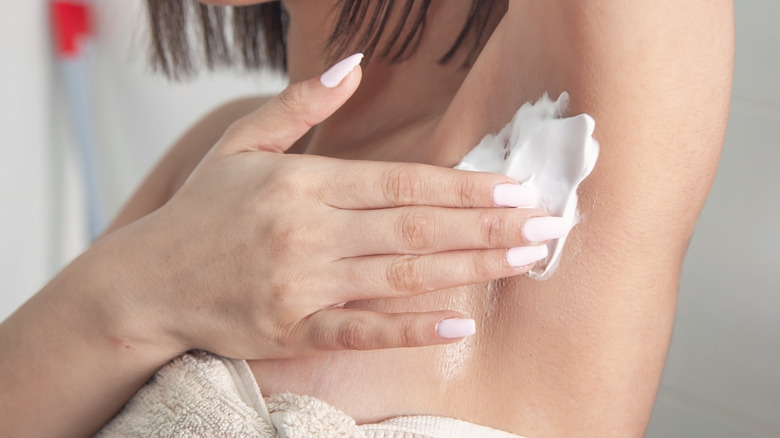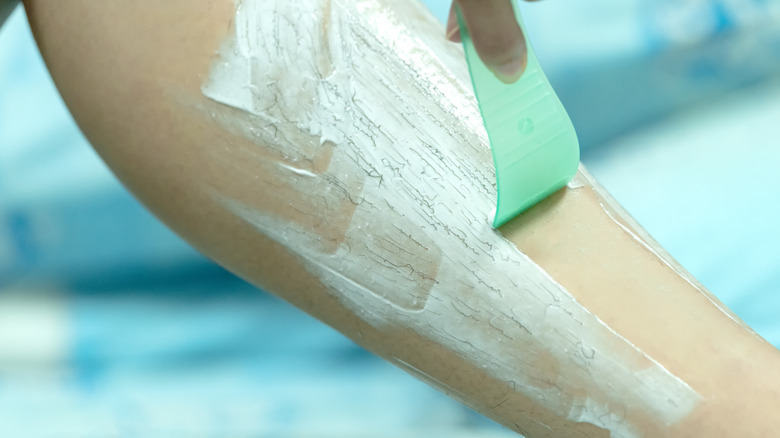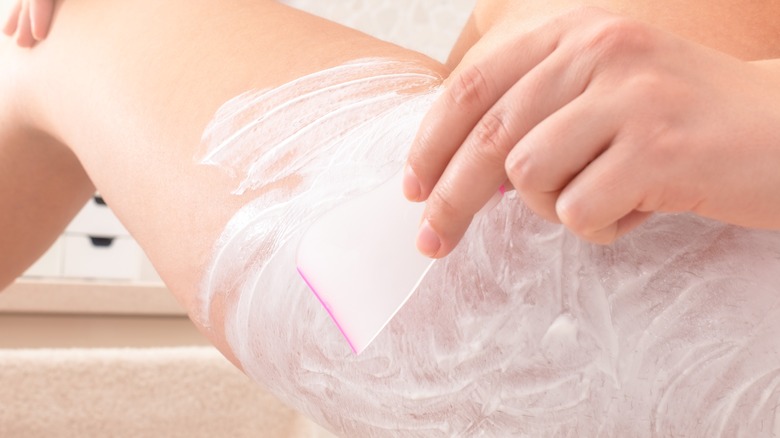Do Hair Removal Creams Really Work Or Are They Too Good To Be True?
If you like to remove your body hair, you're probably familiar with a few methods of getting rid of unwanted fuzz. From shaving and waxing, all the way to epilators, there are countless ways to rid yourself of unwanted body hair. But we're diving into another method — hair removal creams.
In the medical world, hair removal creams are known as depilatory creams. As Lucy Anderson, founder and CEO of WooWoo, explained to Elle, they're designed to be applied to the skin to weaken the keratin in the hair strands. That part of the hair essentially then breaks off, so your skin looks hair-free. That means, once you wipe the product off, you should be left with a smooth area of skin with no or few hair strands left. For best results, Veet recommends exfoliating the skin 24 hours before you apply the cream, so you'll also be left with soft skin, too!
That all sounds great, right? But is it all a little too good to be true? Well, in short, yes and no. There are several big benefits to depilatory creams, but there are also a number of downsides.
Yes, hair removal creams do really work
Of course, there are multiple reasons to give hair removal creams a go. First and foremost, if you follow the instructions properly, it should be a pain-free way to remove hair from almost any part of the body (not all areas though, so check the label). Compared to the most traditional route of shaving, you're less likely to find yourself with cuts with these creams and won't be running the risk of razor burn either. There should also be less discomfort involved compared to either IPL or laser hair removal, as there's no laser or IPL technology involved. And, unlike those methods, hair removal creams tend to be safe and suitable for all skin tones.
Another benefit to hair removal creams is the speed. The time needed will depend on the exact product, where you're using it, and how much hair needs to be removed, but most only need to sit on the skin for around three to 10 minutes. There's also the plus of knowing you can enjoy a few days of silky-smooth skin. Lucy Anderson told Elle that the effects of hair removal cream can last up to four days — longer than the results of shaving for many. Not to mention, because creams don't chop down the hair like razors do, the skin may feel smoother, and you'll avoid razor bumps which could lead to ingrown hairs.
But they do have their downsides
It's important to remember that hair removal cream isn't without its downsides. You must read the instructions when layering on the product, as different creams can have different application techniques and will need to be left on the skin for different amounts of time. If you don't follow the instructions, you could be left with some pretty nasty consequences.
One of the most common is skin irritation. As licensed esthetician, Jodi Shays explained to Byrdie, the chemicals in these creams are essentially burning the hair to break it off, so you could experience issues such as chemical burns, blisters, rashes, and general discomfort on the skin. Equally, because of the chemicals, you must do a patch test first to ensure your skin won't have an adverse reaction, even if the product is used properly.
Another potential downside to hair removal creams? The results aren't permanent. That may be a plus for some, but if you're looking to get rid of your hair somewhat permanently, you'll end up disappointed. Current hair removal creams on the market aren't able to destroy the hair follicle in the way IPLs or laser hair removal can, so they can't offer permanent results. That means if you like the results of creams, it's something you're going to have to add to your routine for the long haul. And while these creams don't tend to be too costly per bottle, you'll probably go through a few over a lifetime.


